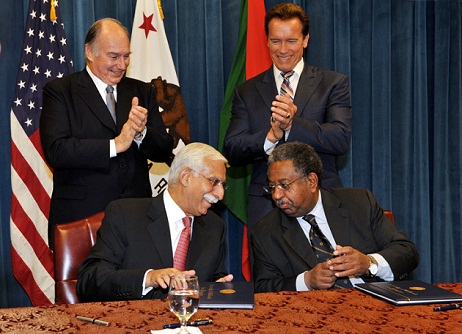AKU-UCSF Partnership
December 2014
 The University of California, San Francisco is
amongst the best research-intensive universities in the world and
recognized as one of the foremost centres for basic, applied and
translational stem cell research. In the 2014 QS World University
Ranking for medicine programme, it ranked nine. The AKU-UCSF partnership
was initiated with the aim to make advancements in the quality, access
and integration of primary health care to promote equitable human
advancement and social justice in the less privileged parts of the
world.
The University of California, San Francisco is
amongst the best research-intensive universities in the world and
recognized as one of the foremost centres for basic, applied and
translational stem cell research. In the 2014 QS World University
Ranking for medicine programme, it ranked nine. The AKU-UCSF partnership
was initiated with the aim to make advancements in the quality, access
and integration of primary health care to promote equitable human
advancement and social justice in the less privileged parts of the
world.
On November 2, 2009, President Firoz Rasul and Dr Haile T. Debas,
then Executive Director of UCSF Global Health Sciences, signed a
Memorandum of Understanding in the presence of His Highness the Aga Khan
and Mr Arnold Schwarzenegger, then Governor of California. The
universities agreed that an initial focus of the partnership would be
research on developing an integrated primary health care (IPHC) model
and stem cell biology.
Photo: Zahur Ramji/AKDN
A. Integrated Primary Health Care Programme
Proposal: An 18-month research and education capacity building programme in Integrated Primary Health Care in East Africa.
Key strategies identified were:
Establishing New Training Programs and Mentorship Support through Exchange (MSE)
Health System Strengthening
Building Health Systems Research Capacity in Primary Care
Status: The programme was successfully carried out between 2011 and 2013.
B. Stem Cell Programme
Proposal: The Board of Trustees
approved and endorsed “stem cell biology” as one of AKU’s core research
themes in 2009. A bi-phased programme has been proposed to develop
critical capacity in stem cell science and regenerative medicine
therapies. A joint presentation of the roadmap was made to the Board of
Trustees by Dr Lalani and Dr Arnold Kriegstein, Director, Eli and Edythe
Broad Center of Regeneration Medicine and Stem Cell Research, UCSF. The
Board gave its enthusiastic approval to the plan.
Phase 1 (2015-2019)
A five-year start-up plan for a stem cell science and therapies that
will establish the critical mass of stem cell researchers and the
state-of-the-art infrastructure which are prerequisites to achieving
these objectives. Specifically this phase involves:
-
focused research;
- capacity building in basic, clinical and translational research;
- education and training;
- construction of core research facilities and regulatory frame works; and, public information, engagement and advocacy.
Phase 2 (2020-2024)
Establish an AKU-Centre for Regenerative Medicine.

